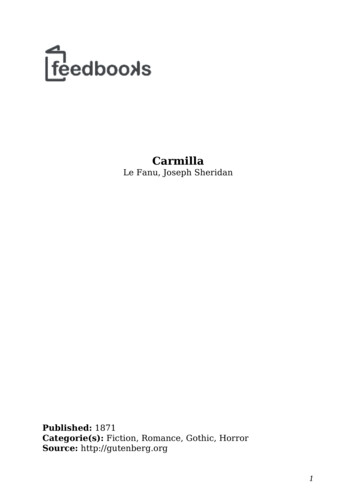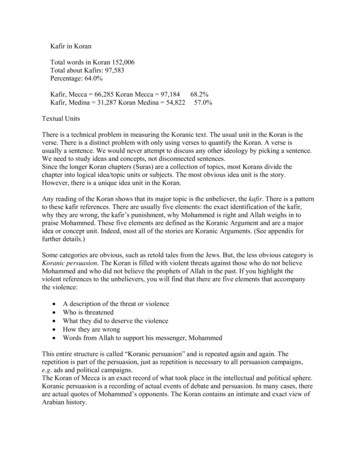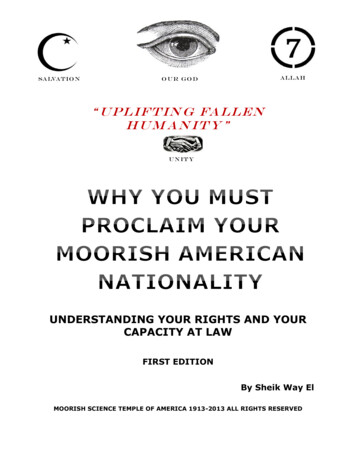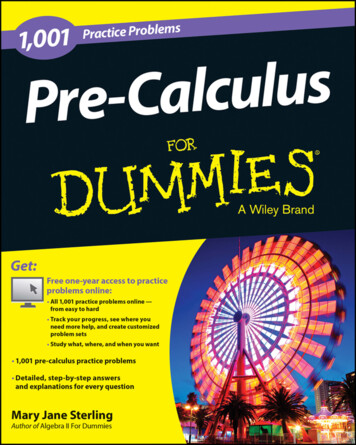
Transcription
CarmillaLe Fanu, Joseph SheridanPublished: 1871Categorie(s): Fiction, Romance, Gothic, HorrorSource: http://gutenberg.org1
About Le Fanu:Sheridan Le Fanu was born at No. 45 Lower Dominick Steet,Dublin, into a literary family of Huguenot origins. Both hisgrandmother Alicia Sheridan Le Fanu and his great-uncleRichard Brinsley Sheridan were playwrights. His niece RhodaBroughton would become a very successful novelist. Within ayear of his birth his family moved to the Royal Hibernian Military School in Phoenix Park, where his father, an Anglican clergyman, was the chaplain of the establishment. Phoenix Parkand the adjacent village and parish church of Chapelizod wereto feature in Le Fanu's later stories. Le Fanu studied law atTrinity College in Dublin, where he was elected Auditor of theCollege Historical Society. He was called to the bar in 1839,but he never practised and soon abandoned law for journalism.In 1838 he began contributing stories to the Dublin UniversityMagazine, including his first ghost story, entitled "A StrangeEvent in the Life of Schalken the Painter" (1839). He becameowner of several newspapers from 1840, including the DublinEvening Mail and the Warder. In 1844 Le Fanu marriedSusanna Bennett, the daughter of a leading Dublin barrister. In1847 he supported John Mitchell and Thomas Meagher in theircampaign against the indifference of the Government to theIrish Famine. His support cost him the nomination as Tory MPfor County Carlow in 1852. His personal life also became difficult at this time, as his wife Susanna suffered from increasingneurotic symptoms. She died in 1858 in unclear circumstances,and anguished excerpts from Le Fanu's diaries suggest that hefelt guilt as well as loss. However, it was only after her deaththat, becoming something of a recluse, he devoted himself fulltime to writing. In 1861 he became the editor and proprietor ofthe Dublin University Magazine and he began exploitingdouble exposure: serializing in the Dublin University Magazineand then revising for the English market. The House by theChurchyard and Wylder's Hand were both published in thisway. After the lukewarm reviews of the former novel, set in thePhoenix Park area of Dublin, Le Fanu signed a contract withRichard Bentley, his London publisher, which specified that future novels be stories "of an English subject and of moderntimes", a step Bentley thought necessary in order for Le Fanuto satisfy the English audience. Le Fanu succeeded in this aim2
in 1864, with the publication of Uncle Silas, which he set inDerbyshire. In his very last short stories, however, Le Fanu returned to Irish folklore as an inspiration and encouraged hisfriend Patrick Kennedy to contribute folklore to the D.U.M. LeFanu died in his native Dublin on February 7, 1873. Todaythere is a road in Ballyfermot, near his childhood home insouth-west Dublin, named after him. Source: WikipediaAlso available on Feedbooks for Le Fanu:A Stable for Nightmares (1896)Uncle Silas (1864)The Child That Went With The Fairies (1870)Ghost Stories of Chapelizod (1851)An Account of Some Strange Disturbances in AungierStreet (1853)An Authentic Narrative of a Haunted House (1862)The House by the Church-Yard (1863)The Mysterious Lodger (1850)Green Tea (1872)The Evil Guest (1851)Note: This book is brought to you by Feedbookshttp://www.feedbooks.comStrictly for personal use, do not use this file for commercialpurposes.3
PrologueUpon a paper attached to the Narrative which follows, DoctorHesselius has written a rather elaborate note, which he accompanies with a reference to his Essay on the strange subjectwhich the MS. illuminates.This mysterious subject he treats, in that Essay, with his usual learning and acumen, and with remarkable directness andcondensation. It will form but one volume of the series of thatextraordinary man's collected papers.As I publish the case, in this volume, simply to interest the"laity," I shall forestall the intelligent lady, who relates it, innothing; and after due consideration, I have determined, therefore, to abstain from presenting any précis of the learnedDoctor's reasoning, or extract from his statement on a subjectwhich he describes as "involving, not improbably, some of theprofoundest arcana of our dual existence, and itsintermediates."I was anxious on discovering this paper, to reopen the correspondence commenced by Doctor Hesselius, so many yearsbefore, with a person so clever and careful as his informantseems to have been. Much to my regret, however, I found thatshe had died in the interval.She, probably, could have added little to the Narrative whichshe communicates in the following pages, with, so far as I canpronounce, such conscientious particularity.4
Chapter1An Early FrightIn Styria, we, though by no means magnificent people, inhabita castle, or schloss. A small income, in that part of the world,goes a great way. Eight or nine hundred a year does wonders.Scantily enough ours would have answered among wealthypeople at home. My father is English, and I bear an Englishname, although I never saw England. But here, in this lonelyand primitive place, where everything is so marvelously cheap,I really don't see how ever so much more money would at allmaterially add to our comforts, or even luxuries.My father was in the Austrian service, and retired upon apension and his patrimony, and purchased this feudal residence, and the small estate on which it stands, a bargain.Nothing can be more picturesque or solitary. It stands on aslight eminence in a forest. The road, very old and narrow,passes in front of its drawbridge, never raised in my time, andits moat, stocked with perch, and sailed over by many swans,and floating on its surface white fleets of water lilies.Over all this the schloss shows its many-windowed front; itstowers, and its Gothic chapel.The forest opens in an irregular and very picturesque gladebefore its gate, and at the right a steep Gothic bridge carriesthe road over a stream that winds in deep shadow through thewood. I have said that this is a very lonely place. Judge whether I say truth. Looking from the hall door towards the road, theforest in which our castle stands extends fifteen miles to theright, and twelve to the left. The nearest inhabited village isabout seven of your English miles to the left. The nearest inhabited schloss of any historic associations, is that of old General Spielsdorf, nearly twenty miles away to the right.5
I have said "the nearest inhabited village," because there is,only three miles westward, that is to say in the direction ofGeneral Spielsdorf's schloss, a ruined village, with its quaintlittle church, now roofless, in the aisle of which are the moldering tombs of the proud family of Karnstein, now extinct, whoonce owned the equally desolate chateau which, in the thick ofthe forest, overlooks the silent ruins of the town.Respecting the cause of the desertion of this striking andmelancholy spot, there is a legend which I shall relate to youanother time.I must tell you now, how very small is the party who constitute the inhabitants of our castle. I don't include servants, orthose dependents who occupy rooms in the buildings attachedto the schloss. Listen, and wonder! My father, who is the kindest man on earth, but growing old; and I, at the date of mystory, only nineteen. Eight years have passed since then.I and my father constituted the family at the schloss. Mymother, a Styrian lady, died in my infancy, but I had a goodnatured governess, who had been with me from, I might almostsay, my infancy. I could not remember the time when her fat,benignant face was not a familiar picture in my memory.This was Madame Perrodon, a native of Berne, whose careand good nature now in part supplied to me the loss of mymother, whom I do not even remember, so early I lost her. Shemade a third at our little dinner party. There was a fourth, Mademoiselle De Lafontaine, a lady such as you term, I believe, a"finishing governess." She spoke French and German, MadamePerrodon French and broken English, to which my father and Iadded English, which, partly to prevent its becoming a lost language among us, and partly from patriotic motives, we spokeevery day. The consequence was a Babel, at which strangersused to laugh, and which I shall make no attempt to reproducein this narrative. And there were two or three young ladyfriends besides, pretty nearly of my own age, who were occasional visitors, for longer or shorter terms; and these visits Isometimes returned.These were our regular social resources; but of course therewere chance visits from "neighbors" of only five or six leaguesdistance. My life was, notwithstanding, rather a solitary one, Ican assure you.6
My gouvernantes had just so much control over me as youmight conjecture such sage persons would have in the case ofa rather spoiled girl, whose only parent allowed her prettynearly her own way in everything.The first occurrence in my existence, which produced a terrible impression upon my mind, which, in fact, never has beeneffaced, was one of the very earliest incidents of my life whichI can recollect. Some people will think it so trifling that itshould not be recorded here. You will see, however, by-and-by,why I mention it. The nursery, as it was called, though I had itall to myself, was a large room in the upper story of the castle,with a steep oak roof. I can't have been more than six yearsold, when one night I awoke, and looking round the room frommy bed, failed to see the nursery maid. Neither was my nursethere; and I thought myself alone. I was not frightened, for Iwas one of those happy children who are studiously kept in ignorance of ghost stories, of fairy tales, and of all such lore asmakes us cover up our heads when the door cracks suddenly,or the flicker of an expiring candle makes the shadow of a bedpost dance upon the wall, nearer to our faces. I was vexed andinsulted at finding myself, as I conceived, neglected, and Ibegan to whimper, preparatory to a hearty bout of roaring;when to my surprise, I saw a solemn, but very pretty face looking at me from the side of the bed. It was that of a young ladywho was kneeling, with her hands under the coverlet. I lookedat her with a kind of pleased wonder, and ceased whimpering.She caressed me with her hands, and lay down beside me onthe bed, and drew me towards her, smiling; I felt immediatelydelightfully soothed, and fell asleep again. I was wakened by asensation as if two needles ran into my breast very deep at thesame moment, and I cried loudly. The lady started back, withher eyes fixed on me, and then slipped down upon the floor,and, as I thought, hid herself under the bed.I was now for the first time frightened, and I yelled with allmy might and main. Nurse, nursery maid, housekeeper, allcame running in, and hearing my story, they made light of it,soothing me all they could meanwhile. But, child as I was, Icould perceive that their faces were pale with an unwontedlook of anxiety, and I saw them look under the bed, and aboutthe room, and peep under tables and pluck open cupboards;7
and the housekeeper whispered to the nurse: "Lay your handalong that hollow in the bed; someone did lie there, so sure asyou did not; the place is still warm."I remember the nursery maid petting me, and all three examining my chest, where I told them I felt the puncture, andpronouncing that there was no sign visible that any such thinghad happened to me.The housekeeper and the two other servants who were incharge of the nursery, remained sitting up all night; and fromthat time a servant always sat up in the nursery until I wasabout fourteen.I was very nervous for a long time after this. A doctor wascalled in, he was pallid and elderly. How well I remember hislong saturnine face, slightly pitted with smallpox, and hischestnut wig. For a good while, every second day, he came andgave me medicine, which of course I hated.The morning after I saw this apparition I was in a state ofterror, and could not bear to be left alone, daylight though itwas, for a moment.I remember my father coming up and standing at the bedside, and talking cheerfully, and asking the nurse a number ofquestions, and laughing very heartily at one of the answers;and patting me on the shoulder, and kissing me, and telling menot to be frightened, that it was nothing but a dream and couldnot hurt me.But I was not comforted, for I knew the visit of the strangewoman was not a dream; and I was awfully frightened.I was a little consoled by the nursery maid's assuring me thatit was she who had come and looked at me, and lain down beside me in the bed, and that I must have been half-dreamingnot to have known her face. But this, though supported by thenurse, did not quite satisfy me.I remembered, in the course of that day, a venerable oldman, in a black cassock, coming into the room with the nurseand housekeeper, and talking a little to them, and very kindlyto me; his face was very sweet and gentle, and he told me theywere going to pray, and joined my hands together, and desiredme to say, softly, while they were praying, "Lord hear all goodprayers for us, for Jesus' sake." I think these were the very8
words, for I often repeated them to myself, and my nurse usedfor years to make me say them in my prayers.I remembered so well the thoughtful sweet face of thatwhite-haired old man, in his black cassock, as he stood in thatrude, lofty, brown room, with the clumsy furniture of a fashionthree hundred years old about him, and the scanty light entering its shadowy atmosphere through the small lattice. Hekneeled, and the three women with him, and he prayed aloudwith an earnest quavering voice for, what appeared to me, along time. I forget all my life preceding that event, and forsome time after it is all obscure also, but the scenes I have justdescribed stand out vivid as the isolated pictures of the phantasmagoria surrounded by darkness.9
Chapter2A GuestI am now going to tell you something so strange that it will require all your faith in my veracity to believe my story. It is notonly true, nevertheless, but truth of which I have been aneyewitness.It was a sweet summer evening, and my father asked me, ashe sometimes did, to take a little ramble with him along thatbeautiful forest vista which I have mentioned as lying in frontof the schloss."General Spielsdorf cannot come to us so soon as I hadhoped," said my father, as we pursued our walk.He was to have paid us a visit of some weeks, and we had expected his arrival next day. He was to have brought with him ayoung lady, his niece and ward, Mademoiselle Rheinfeldt,whom I had never seen, but whom I had heard described as avery charming girl, and in whose society I had promised myselfmany happy days. I was more disappointed than a young ladyliving in a town, or a bustling neighborhood can possibly imagine. This visit, and the new acquaintance it promised, had furnished my day dream for many weeks."And how soon does he come?" I asked."Not till autumn. Not for two months, I dare say," heanswered. "And I am very glad now, dear, that you never knewMademoiselle Rheinfeldt.""And why?" I asked, both mortified and curious."Because the poor young lady is dead," he replied. "I quiteforgot I had not told you, but you were not in the room when Ireceived the General's letter this evening."I was very much shocked. General Spielsdorf had mentionedin his first letter, six or seven weeks before, that she was not10
so well as he would wish her, but there was nothing to suggestthe remotest suspicion of danger."Here is the General's letter," he said, handing it to me. "I amafraid he is in great affliction; the letter appears to me to havebeen written very nearly in distraction."We sat down on a rude bench, under a group of magnificentlime trees. The sun was setting with all its melancholy splendorbehind the sylvan horizon, and the stream that flows besideour home, and passes under the steep old bridge I have mentioned, wound through many a group of noble trees, almost atour feet, reflecting in its current the fading crimson of the sky.General Spielsdorf's letter was so extraordinary, so vehement,and in some places so self-contradictory, that I read it twiceover—the second time aloud to my father—and was still unableto account for it, except by supposing that grief had unsettledhis mind.It said "I have lost my darling daughter, for as such I lovedher. During the last days of dear Bertha's illness I was not ableto write to you."Before then I had no idea of her danger. I have lost her, andnow learn all, too late. She died in the peace of innocence, andin the glorious hope of a blessed futurity. The fiend who betrayed our infatuated hospitality has done it all. I thought I wasreceiving into my house innocence, gaiety, a charming companion for my lost Bertha. Heavens! what a fool have I been!"I thank God my child died without a suspicion of the causeof her sufferings. She is gone without so much as conjecturingthe nature of her illness, and the accursed passion of the agentof all this misery. I devote my remaining days to tracking andextinguishing a monster. I am told I may hope to accomplishmy righteous and merciful purpose. At present there isscarcely a gleam of light to guide me. I curse my conceited incredulity, my despicable affectation of superiority, my blindness, my obstinacy—all—too late. I cannot write or talk collectedly now. I am distracted. So soon as I shall have a little recovered, I mean to devote myself for a time to enquiry, whichmay possibly lead me as far as Vienna. Some time in the autumn, two months hence, or earlier if I live, I will see you—thatis, if you permit me; I will then tell you all that I scarce dareput upon paper now. Farewell. Pray for me, dear friend."11
In these terms ended this strange letter. Though I had neverseen Bertha Rheinfeldt my eyes filled with tears at the suddenintelligence; I was startled, as well as profoundly disappointed.The sun had now set, and it was twilight by the time I had returned the General's letter to my father.It was a soft clear evening, and we loitered, speculating uponthe possible meanings of the violent and incoherent sentenceswhich I had just been reading. We had nearly a mile to walkbefore reaching the road that passes the schloss in front, andby that time the moon was shining brilliantly. At the drawbridge we met Madame Perrodon and Mademoiselle De Lafontaine, who had come out, without their bonnets, to enjoy theexquisite moonlight.We heard their voices gabbling in animated dialogue as weapproached. We joined them at the drawbridge, and turnedabout to admire with them the beautiful scene.The glade through which we had just walked lay before us.At our left the narrow road wound away under clumps of lordlytrees, and was lost to sight amid the thickening forest. At theright the same road crosses the steep and picturesque bridge,near which stands a ruined tower which once guarded thatpass; and beyond the bridge an abrupt eminence rises, coveredwith trees, and showing in the shadows some grey ivyclustered rocks.Over the sward and low grounds a thin film of mist was stealing like smoke, marking the distances with a transparent veil;and here and there we could see the river faintly flashing inthe moonlight.No softer, sweeter scene could be imagined. The news I hadjust heard made it melancholy; but nothing could disturb itscharacter of profound serenity, and the enchanted glory andvagueness of the prospect.My father, who enjoyed the picturesque, and I, stood lookingin silence over the expanse beneath us. The two good governesses, standing a little way behind us, discoursed upon thescene, and were eloquent upon the moon.Madame Perrodon was fat, middle-aged, and romantic, andtalked and sighed poetically. Mademoiselle De Lafontaine—inright of her father who was a German, assumed to be psychological, metaphysical, and something of a mystic—now declared12
that when the moon shone with a light so intense it was wellknown that it indicated a special spiritual activity. The effect ofthe full moon in such a state of brilliancy was manifold. It actedon dreams, it acted on lunacy, it acted on nervous people, ithad marvelous physical influences connected with life. Mademoiselle related that her cousin, who was mate of a merchant ship, having taken a nap on deck on such a night, lyingon his back, with his face full in the light on the moon, hadwakened, after a dream of an old woman clawing him by thecheek, with his features horribly drawn to one side; and hiscountenance had never quite recovered its equilibrium."The moon, this night," she said, "is full of idyllic and magnetic influence—and see, when you look behind you at the frontof the schloss how all its windows flash and twinkle with thatsilvery splendor, as if unseen hands had lighted up the roomsto receive fairy guests."There are indolent styles of the spirits in which, indisposedto talk ourselves, the talk of others is pleasant to our listlessears; and I gazed on, pleased with the tinkle of the ladies'conversation."I have got into one of my moping moods tonight," said myfather, after a silence, and quoting Shakespeare, whom, by wayof keeping up our English, he used to read aloud, he said:"'In truth I know not why I am so sad. It wearies me: you sayit wearies you; But how I got it—came by it.'"I forget the rest. But I feel as if some great misfortune werehanging over us. I suppose the poor General's afflicted letterhas had something to do with it."At this moment the unwonted sound of carriage wheels andmany hoofs upon the road, arrested our attention.They seemed to be approaching from the high ground overlooking the bridge, and very soon the equipage emerged fromthat point. Two horsemen first crossed the bridge, then came acarriage drawn by four horses, and two men rode behind.It seemed to be the traveling carriage of a person of rank;and we were all immediately absorbed in watching that veryunusual spectacle. It became, in a few moments, greatly moreinteresting, for just as the carriage had passed the summit ofthe steep bridge, one of the leaders, taking fright, communicated his panic to the rest, and after a plunge or two, the whole13
team broke into a wild gallop together, and dashing betweenthe horsemen who rode in front, came thundering along theroad towards us with the speed of a hurricane.The excitement of the scene was made more painful by theclear, long-drawn screams of a female voice from the carriagewindow.We all advanced in curiosity and horror; me rather in silence,the rest with various ejaculations of terror.Our suspense did not last long. Just before you reach thecastle drawbridge, on the route they were coming, therestands by the roadside a magnificent lime tree, on the otherstands an ancient stone cross, at sight of which the horses,now going at a pace that was perfectly frightful, swerved so asto bring the wheel over the projecting roots of the tree.I knew what was coming. I covered my eyes, unable to see itout, and turned my head away; at the same moment I heard acry from my lady friends, who had gone on a little.Curiosity opened my eyes, and I saw a scene of utter confusion. Two of the horses were on the ground, the carriage layupon its side with two wheels in the air; the men were busy removing the traces, and a lady with a commanding air and figure had got out, and stood with clasped hands, raising thehandkerchief that was in them every now and then to her eyes.Through the carriage door was now lifted a young lady, whoappeared to be lifeless. My dear old father was already besidethe elder lady, with his hat in his hand, evidently tendering hisaid and the resources of his schloss. The lady did not appear tohear him, or to have eyes for anything but the slender girl whowas being placed against the slope of the bank.I approached; the young lady was apparently stunned, butshe was certainly not dead. My father, who piqued himself onbeing something of a physician, had just had his fingers on herwrist and assured the lady, who declared herself her mother,that her pulse, though faint and irregular, was undoubtedlystill distinguishable. The lady clasped her hands and looked upward, as if in a momentary transport of gratitude; but immediately she broke out again in that theatrical way which is, I believe, natural to some people.She was what is called a fine looking woman for her time oflife, and must have been handsome; she was tall, but not thin,14
and dressed in black velvet, and looked rather pale, but with aproud and commanding countenance, though now agitatedstrangely."Who was ever being so born to calamity?" I heard her say,with clasped hands, as I came up. "Here am I, on a journey oflife and death, in prosecuting which to lose an hour is possiblyto lose all. My child will not have recovered sufficiently to resume her route for who can say how long. I must leave her: Icannot, dare not, delay. How far on, sir, can you tell, is thenearest village? I must leave her there; and shall not see mydarling, or even hear of her till my return, three monthshence."I plucked my father by the coat, and whispered earnestly inhis ear: "Oh! papa, pray ask her to let her stay with us—itwould be so delightful. Do, pray.""If Madame will entrust her child to the care of my daughter,and of her good gouvernante, Madame Perrodon, and permither to remain as our guest, under my charge, until her return,it will confer a distinction and an obligation upon us, and weshall treat her with all the care and devotion which so sacred atrust deserves.""I cannot do that, sir, it would be to task your kindness andchivalry too cruelly," said the lady, distractedly."It would, on the contrary, be to confer on us a very greatkindness at the moment when we most need it. My daughterhas just been disappointed by a cruel misfortune, in a visitfrom which she had long anticipated a great deal of happiness.If you confide this young lady to our care it will be her bestconsolation. The nearest village on your route is distant, andaffords no such inn as you could think of placing your daughterat; you cannot allow her to continue her journey for any considerable distance without danger. If, as you say, you cannot suspend your journey, you must part with her tonight, andnowhere could you do so with more honest assurances of careand tenderness than here."There was something in this lady's air and appearance so distinguished and even imposing, and in her manner so engaging,as to impress one, quite apart from the dignity of her equipage,with a conviction that she was a person of consequence.15
By this time the carriage was replaced in its upright position,and the horses, quite tractable, in the traces again.The lady threw on her daughter a glance which I fancied wasnot quite so affectionate as one might have anticipated fromthe beginning of the scene; then she beckoned slightly to myfather, and withdrew two or three steps with him out of hearing; and talked to him with a fixed and stern countenance, notat all like that with which she had hitherto spoken.I was filled with wonder that my father did not seem to perceive the change, and also unspeakably curious to learn what itcould be that she was speaking, almost in his ear, with so muchearnestness and rapidity.Two or three minutes at most I think she remained thus employed, then she turned, and a few steps brought her to whereher daughter lay, supported by Madame Perrodon. She kneeledbeside her for a moment and whispered, as Madame supposed,a little benediction in her ear; then hastily kissing her shestepped into her carriage, the door was closed, the footmen instately liveries jumped up behind, the outriders spurred on, thepostilions cracked their whips, the horses plunged and brokesuddenly into a furious canter that threatened soon again tobecome a gallop, and the carriage whirled away, followed atthe same rapid pace by the two horsemen in the rear.16
Chapter3We Compare NotesWe followed the cortege with our eyes until it was swiftly lostto sight in the misty wood; and the very sound of the hoofs andthe wheels died away in the silent night air.Nothing remained to assure us that the adventure had notbeen an illusion of a moment but the young lady, who just atthat moment opened her eyes. I could not see, for her face wasturned from me, but she raised her head, evidently lookingabout her, and I heard a very sweet voice ask complainingly,"Where is mamma?"Our good Madame Perrodon answered tenderly, and addedsome comfortable assurances.I then heard her ask:"Where am I? What is this place?" and after that she said, "Idon't see the carriage; and Matska, where is she?"Madame answered all her questions in so far as she understood them; and gradually the young lady remembered how themisadventure came about, and was glad to hear that no one in,or in attendance on, the carriage was hurt; and on learningthat her mamma had left her here, till her return in about threemonths, she wept.I was going to add my consolations to those of Madame Perrodon when Mademoiselle De Lafontaine placed her hand uponmy arm, saying:"Don't approach, one at a time is as much as she can atpresent converse with; a very little excitement would possiblyoverpower her now."As soon as she is comfortably in bed, I thought, I will run upto her room and see her.17
My father in the meantime had sent a servant on horsebackfor the physician, who lived about two leagues away; and abedroom was being prepared for the young lady's reception.The stranger now rose, and leaning on Madame's arm,walked slowly over the drawbridge and into the castle gate.In the hall, servants waited to receive her, and she was conducted forthwith to her room. The room we usually sat in asour drawing room is long, having four windows, that lookedover the moat and drawbridge, upon the forest scene I havejust described.It is furnished in
About Le Fanu: Sheridan Le Fanu was born at No. 45 Lower Dominick Steet, Dublin, into a literary family of Huguenot origins. Both his grandmother Alicia Sheridan Le Fanu and his great-uncle










